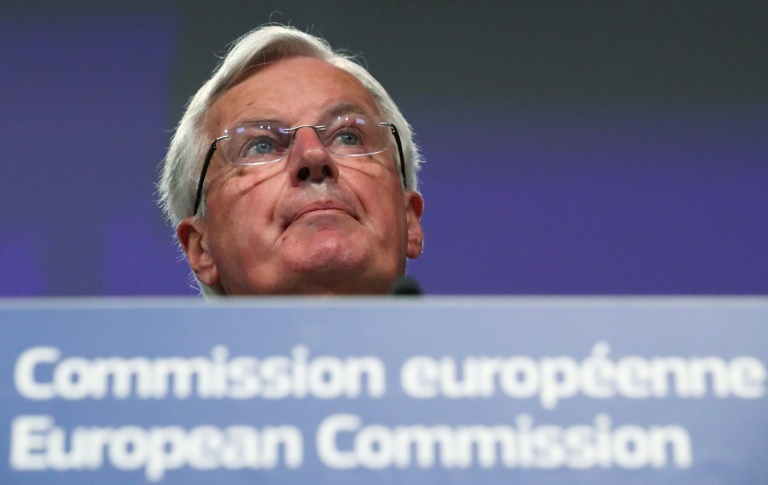The latest round of Brexit trade talks ended with no breakthrough Friday, as the EU and Britain stuck to long-held positions and called for negotiations to be ramped up.
The EU’s chief negotiator Michel Barnier could report “no significant progress this week”, accusing London of backtracking on divorce terms agreed last year.
“This situation cannot go on forever,” Barnier told reporters after hundreds of officials completed four days of virtual talks on forging future EU-UK ties.
The former French minister added that any agreement must be reached before October 31 in order for it to be ratified before the end of the year.
This is when Britain will leave the EU’s single market and customs union with or without a trade deal.
Barnier’s UK counterpart David Frost noted “limited” advances and asked that both sides “intensify and accelerate our work” in order to clinch the deal.
Barnier said the next round of talks would take place in late June or early July as officials talked of a busy summer ahead for negotiations.
Read Also: Brexit: Johnson To Detail Tough Stance In EU Trade Talks
“I have no doubt that we will find common ground over the course of the summer and by early autumn at the latest,” Barnier added.
– Planned summit –
At times frustrated, Barnier said British negotiators were seeking to backtrack on commitments already made when Britain’s Prime Minister Boris Johnson signed a political declaration with EU members last year.
Barnier said this declaration — legally a non-binding annex to the Brexit withdrawal agreement — could be the “only reference” for the talks.
Expectations among Brexit-watchers were very low for this round of talks, and most in Brussels believe a breakthrough is not likely before the autumn.
On key issues like a level-playing field rules for business, fishing rights and an overarching framework for the accord, “the British are no longer pretending to negotiate,” a European source close to the talks complained.
All focus now turns to talks between Johnson and EU chiefs Ursula von der Leyen and Charles Michel at an unspecified date later this month.
The meeting will not involve the EU’s key national leaders, such as German Chancellor Angela Merkel or French President Emmanuel Macron, who will be decisive to any breakthrough.
The “high-level” meeting will also be the last chance for Johnson to ask for an extension to the negotiations beyond the end of the year when a transition period that keeps Britain aligned to EU rules comes to an end.
Johnson has categorically ruled out prolonging the transition period and the Europeans are working under the assumption that London will not change its mind.
Some on the EU side fear that Johnson, who became prime minister on a promise to deliver a hardline Brexit, may not be serious about striking a trade deal, despite the consequences for the economy.
“At some stage we will have to look at whether we believe that an agreement is very likely,” Germany’s envoy to the EU Michael Clauss said on Thursday.
“If that is quite unclear then no-deal planning will have to enter a higher gear,” he said.
– No EU law –
The negotiation flashpoints have remained the same since talks began in March.
London and Brussels starkly disagree on ways to assure fair competition under the terms of the trade deal, as well as how much access European fishing vessels will have to British waters.
Barnier’s negotiation mandate states clearly that ensuring a level playing field for competition must meet European standards, with the EU’s highest court the final arbiter of what will be considered fair.
Britain bristles at this demand and considers the mere mention of EU law unacceptable and well beyond what Europe asks of other trade deal partners.
On fishing rights, France and other coastal states are looking to maintain as much access to British waters as possible, although Barnier conceded the EU would have to budge.
The few months left for talks means that European hopes for a wide-ranging deal that would also include security, foreign policy or development are probably dashed.
A sense of urgency has also been sapped by the coronavirus outbreak that has made Brexit talks a lower priority in EU capitals.
AFP
